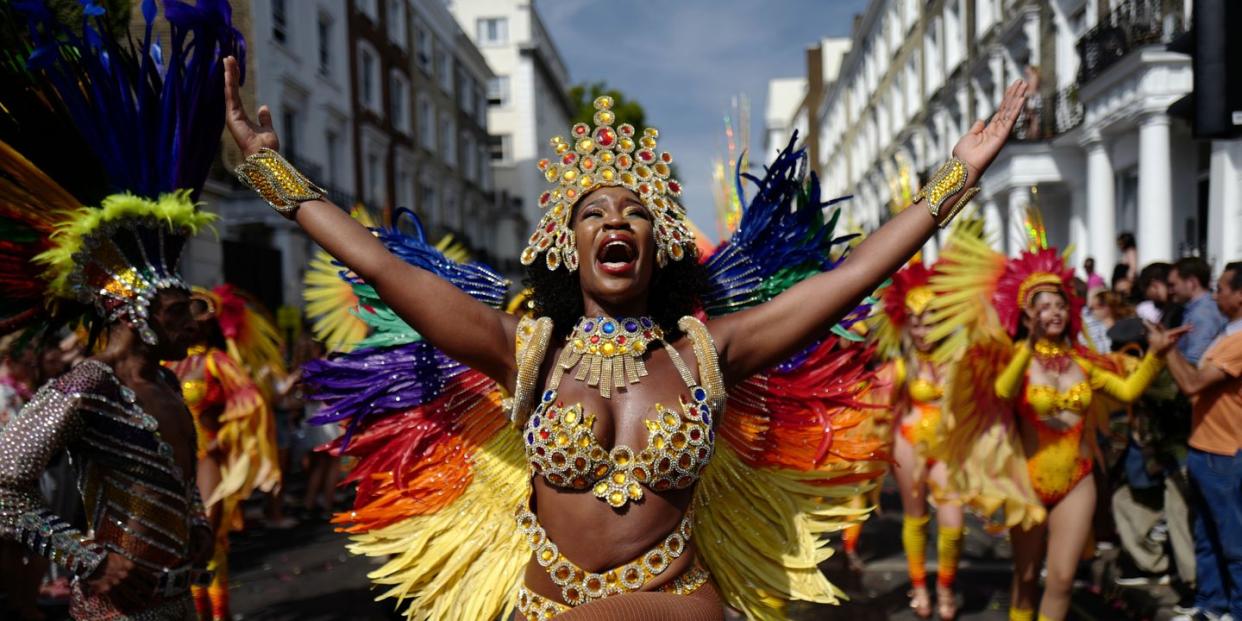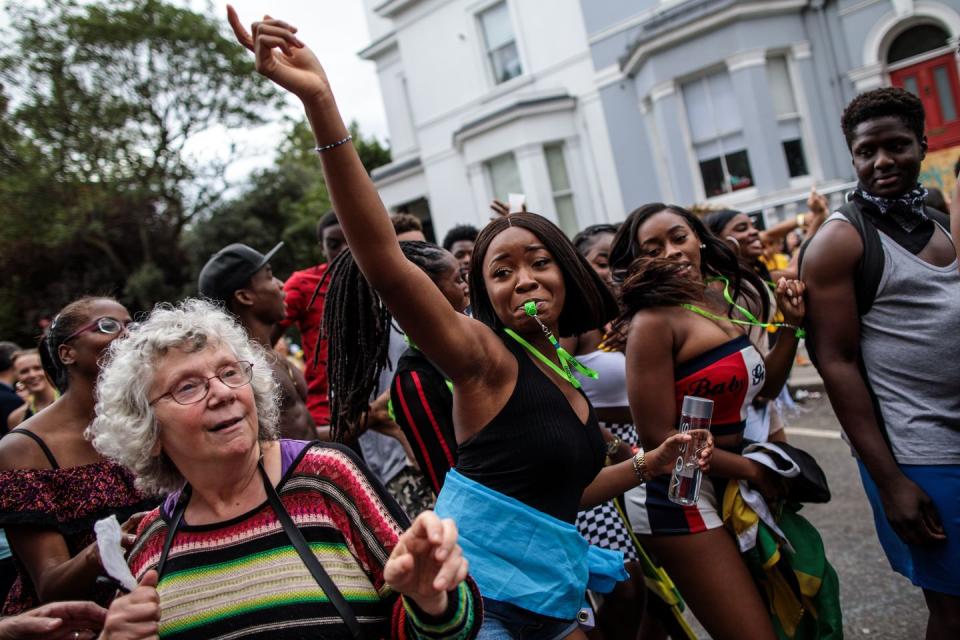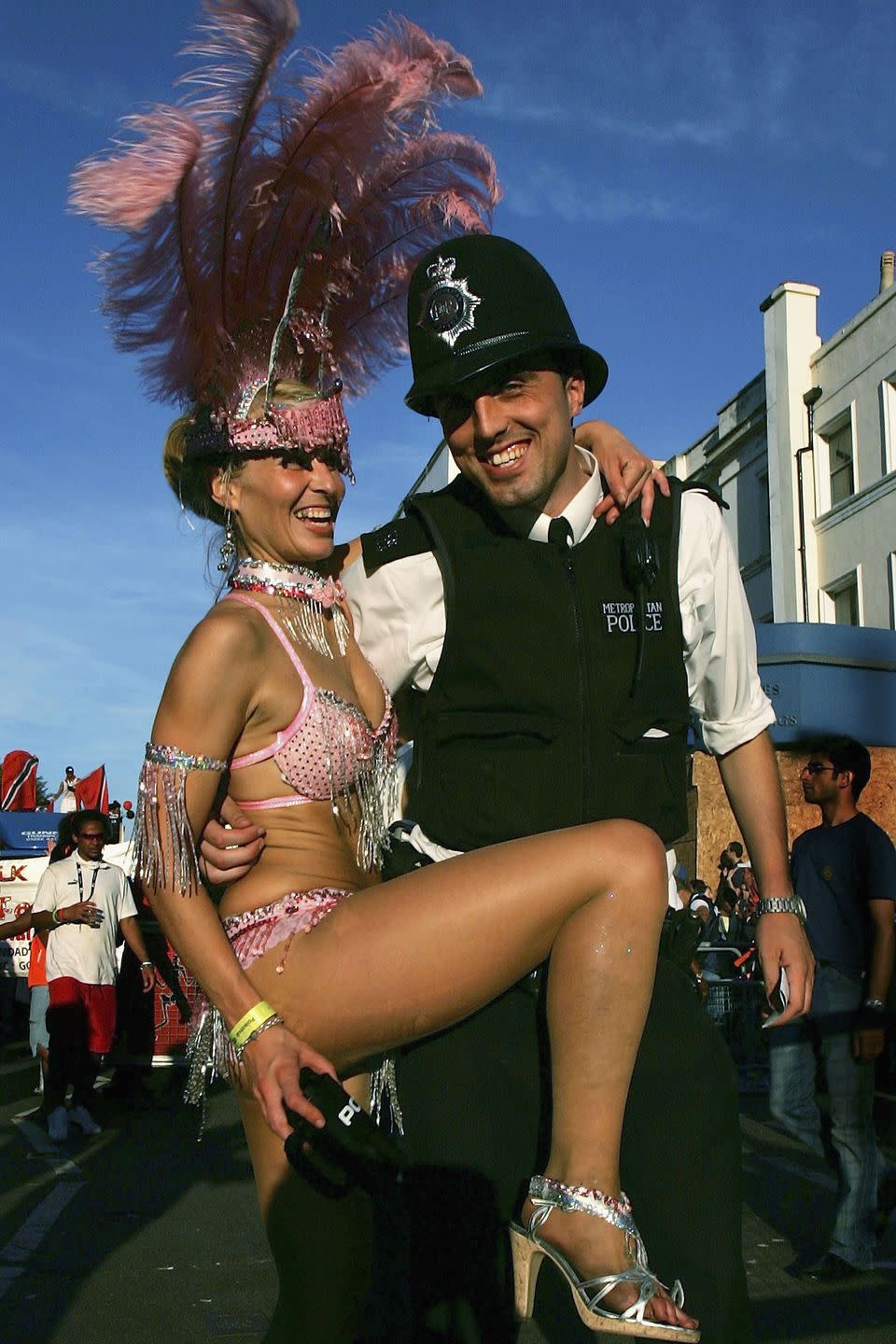A love letter to Notting Hill Carnival: the best that London has to offer

Notting Hill Carnival, the annual celebration of Caribbean culture, will not take place for the first time in its 54-year history this weekend, thanks to Covid-19. While the organisers are hosting a three-day-long digital equivalent that will kick off with a live countdown on the big screen at Piccadilly Circus, we look back at the physical version and explore what makes carnival so crucial this year and every year.
Notting Hill Carnival is summer’s version of Christmas Day. Loud, joyful and gloriously unruly, it is the best of London. For two days every summer, one million people from different backgrounds, cultures and ages head to Notting Hill to dance in the streets. Typically reserved Londoners shimmy and wiggle their way down the roads and pavements to reggae, samba, ska, soca, bashment, afrobeats and calypso, a cold beer in hand and the prospect of jerk chicken in their minds. In my experience, people only stop dancing when they can’t walk any further.
It’s better when the sun shines, but there is nothing more perfectly British than seeing two elderly Jamaican women determinedly eating rice and peas by the side of the road while stood under umbrellas in the rain. There is nothing on earth that can rain on this parade, not even a pandemic. Well, maybe a pandemic. Covid-19 might mean that the event has been cancelled for the first time in its history, but a replacement three-day-long digital festival promises music and performances, including 14 sound systems, 20 dancehall and soca artists and street theatre performers that will offer a flavour of the parade.
The beating heart of carnival is the parade, which pumps out colour, glitter, feathers and music through the streets of W10 and W11 for two days straight. People spend up to a year working on their costumes to march en masse, festooned in sequins, diamantés and so much colour that it shocks your eyes. Different sound systems blast varying genres of music from buses and floats, and then there’s the live music – the Trinidadian steel drummers who come in groups as large as 150 filling the air with rhythmic tropical cheer, the New Orleans-style big brass bands who perform on different stages and the Afro-Brazilian Maracatu percussion and drummers accompanied by dancers decked in unified costumes.
Hearing is unquestionably the sense that gets it the most during carnival. It’s not just the music, although the bassline never hits your eardrums more satisfyingly than from the various speaker stacks dotted around the streets, but it’s also the whistles, the vuvuzelas, car horns and the background noise of people having a really good time. Notting Hill Carnival is the biggest street party in Europe – there is nowhere outside of Rio that you will find so many people dancing under so many different flags. It doesn’t matter how uncoordinated or rigid you claim to be, as the wise Gloria Esteban once said, the rhythm will get you. Few things feel as good as dancing to Toots and the Maytals with your hands in the air, Red Stripe in hand, surrounded by your best friends.

Carnival isn’t for the fainthearted. You will likely lose a friend or two among the bright plumes of feathers and glitter, and don’t even try and meet anyone anywhere other than a designated tube station. Your phone will lose signal, and you will step on broken glass unless you wear trainers. If you need the toilet, you will have to queue either for a hold-your-nose-or-die-style portaloo or alternatively an entrepreneurial local who will let you queue to use the bathroom in their home for a small fee of £5. The negatives, the fighting and the drugs, inevitably attract more attention than the positives, but these are components of any crowded festival where drinking starts early. The difference is that people don’t ask about whether or not Glastonbury is violent or dangerous, despite the arrest rates being similar. These headlines prove why carnival – an expression and celebration of Black culture and identity – is still so necessary.


Beyond the fun that comes with good music, good food, cold beer and dancing, Notting Hill Carnival is important. What began in 1959 as a response to UK racist attacks and rioting has become a reminder of what multiculturalism has achieved – food, fashion, music and so much joy – and why London continues to be such a great city. In a year when the issues surrounding racism in America, the UK and beyond have been reignited, when so many of us have become more aware of the despicable discriminatory treatment of the Black community, NHC is crucial. We must show our support and tune into the digital version. This is so much more than a cancelled party; carnival is about giving oppressed communities an opportunity to express themselves and to take up space. Our society is fragmented; carnival shows us how good it can be when we come together.
The online equivalent will prove less exhausting than the physical original - not that I've ever cared much about that. When you finally get to sleep after a day at carnival, your ears ring and your feet ache. This raucous spectacle might tire your body well and truly, but it’s a tonic for the soul.
Notting Hill Carnival will take place from 9am on Saturday 29 - 31st August via nhcarnival.org.
In need of some at-home inspiration? Sign up to our free weekly newsletter for skincare and self-care, the latest cultural hits to read and download, and the little luxuries that make staying in so much more satisfying.
You Might Also Like


